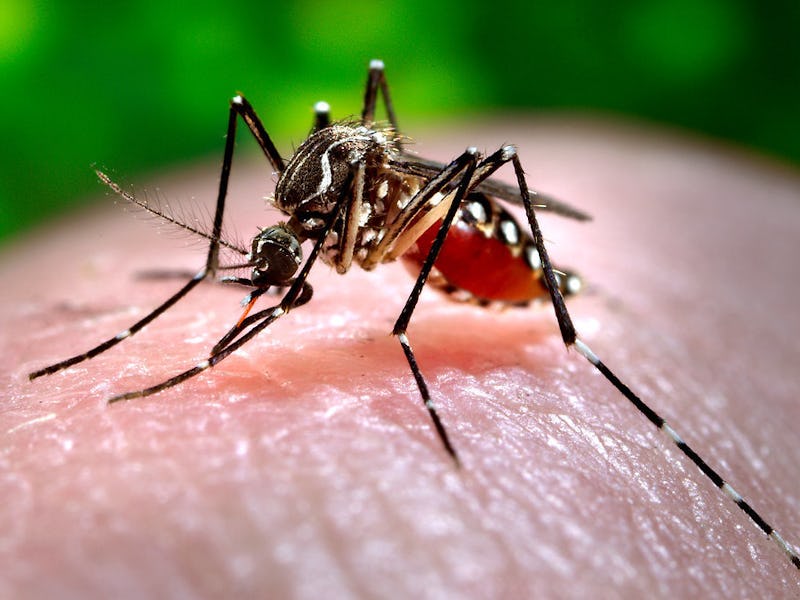Science Explains What Kind of Blood Mosquitos Like Best
They're choosy little bloodsuckers.

It if feels mosquitos are ignoring all your friends and making a beeline straight for you, rest assured: You’re not alone, and it’s not all in your head. It turns out that the bloodsuckers are actually choosy when it comes to choosing a meal, and some people just smell like they will taste more delicious than others.
The bad news is, there’s not a whole lot you can do about it. One recent study compared the attractiveness of identical and fraternal twin pairs to mosquitos. Each twin offered a hand to one end of a container of mosquitos, and after getting a chance to sniff out the options, the bugs were released to fly in the direction of their chosen prey. The researchers found that mosquitos had no preference between identical twins, but tended to have preferences between fraternal twins. That goes to show a very large part of mosquito preference is genetic — literally written in your DNA.
But that doesn’t explain what exactly it is about certain people that makes them a target. The answer is probably many things, and scientists are starting to figure out some of them. A separate study found that mosquitoes are most attracted to people with Type O blood. Identical twins almost always have the same blood type, so this could be a significant genetic reason for mosquito preferences.
But it’s likely not the whole story. Chemicals secreted by your skin surely also play a role in how nice you smell to a mosquito, and there are natural compounds that attract as well as repel mosquitos. These are probably mediated by your genes but also by other factors, like what you eat and drink, and the particular colonies of microorganisms that have taken up residence on your skin. One study found that beer drinking makes people smell tastier to a mosquito, although the researchers couldn’t exactly figure out why — ethanol on the skin didn’t attract mosquitos on its own, and neither did a higher skin temperature, which is a side effect of imbibing.
Outside of a tightly-controlled laboratory environment, many non-genetic factors will play a role in how many mosquitos come to suck your blood. Carbon dioxide is a major mosquito attractant, so the more you exercise, the more you will breathe, and the easier you will be to find. Exercise also makes you sweat, which releases more compounds that smell good to a mosquito. Your clothing choices also play a role — dark colors will make you easier to find. A super savvy shopper would buy zebra-print, as a study last year found that the distinctive stripes probably evolved to ward against biting flies.
Another reason you might feel ravaged while your camping partner feels fine could have to do with your sensitivity to mosquito bites. Some people have strong allergic reactions to mosquito saliva, which results in red, swollen, itchy welts, while other people don’t seem to notice at all. If this is you, an antihistamine could help control the symptoms, in addition to topical anti-itch products.
Today, the best defense against the world’s most annoying and most deadly insect remains long sleeved clothing, mosquito nets, and DEET-based repellants. But that could change. Scientists are working on new products based on the natural chemicals that some people secrete and mosquitos don’t seem to like, which could replace more toxic alternatives. Maybe one day we’ll be able to hit the problem at the very source — tweaking our genetic code so that we just don’t smell that tasty to a bloodsucker.